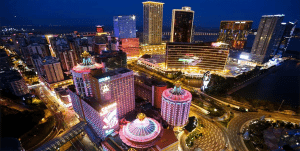 China’s special administrative region of Macau has long been a hot-spot for gamblers, with much of its economy relying on income generated from the high-end casinos. But as the gambling economy continues to slow down, Macau is now seeking ways to diversity its tourist offerings beyond the gambling industry.
China’s special administrative region of Macau has long been a hot-spot for gamblers, with much of its economy relying on income generated from the high-end casinos. But as the gambling economy continues to slow down, Macau is now seeking ways to diversity its tourist offerings beyond the gambling industry.
Coined the Las Vegas of the East, Macau’s gambling revenue has started to decline over the past couple of years due to the Chinese government crackdown on corruption, deterring the high-rollers who once pumped big bucks into Macau’s casinos.
In the past, more than 90 per cent of visitors to Macau have come from mainland China, Taiwan and Hong Kong, but a new trend of visitors from other countries is starting to emerge, resulting in Macau looking to re-position itself as a tourist destination for more than just casinos. While the income generated from high-rollers will continue to be Macau’s major source of expenditure, plenty of other tourism opportunities await.
Government statistics show the number of tourists from Singapore, Malaysia and Japan are starting to match those from mainland China, but these visitors are not coming to gamble. A tourist from Singapore told Reuters, “We just want to see the old town. We are more interested in the tourist attractions. We definitely didn’t come here for gambling.”
Agnes Lam, head of social political organisation Macau Civic Power said, “In the past decade, we relied too much on mainland tourists. I think the increase of foreign tourists is very important to Macau and will actually make the tourist industry here become more healthy.”
Industry experts are now calling for Macau to differentiate itself from other casino hubs around Asia by flaunting its culture, history and Portuguese-influenced gastronomy. A high-profile marketing campaign will be launched to appeal to tourists interested in food, shopping and sightseeing.
Despite the new focus, Macau’s casino industry is expected to continue to flourish, with recent statistics showing a slow return of VIP spenders. Two new integrated casino resorts are due to open within two years, with hotel rooms set to increase by 40 per cent as developers aim to recapture some of Macau’s original allure.
Glenn McCartney, assistant professor of hospitality and gaming management at the University of Macau, said “The hotels used to be more of a support system to the casino industry in Macau, but now, because of gaming revenue decline and fewer high-rollers visiting, the hotels and the rooms themselves have to be elevated in importance.”
Shaun Rein, director of China Market Research Group, thinks Macau’s tourism sector needs to move away from the old mega-resort formula and instead focus on visitors seeking a more cultural, boutique experience.
Rein said, “Bigger is no longer always better. I think five or 10 years ago, everybody wanted to go to these over-the-top hotels, but what we’re finding right now is that people are looking for a different experience and more boutique-like hotels that have themes.”
He argues casino operators are losing sight of what consumers want, especially those from mainland China. “The new luxury in China is not buying Louis Vuitton anymore,” he said. “It’s about posting on WeChat Moments where you’ve travelled to. That’s the new luxury status. When we interview people, they [say they] like to go to New Zealand, Botswana, South Africa, France or Japan and share their photos. It’s showing their friends that they’re living the good life. It’s not about throwing down a US$1 million bet in Macau anymore.”














